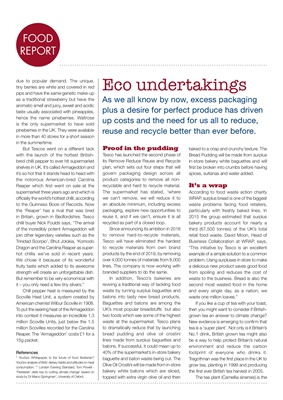
LIVINGLIVING
Proof in the pudding
Tesco has launched the second phase of
its Remove Reduce Reuse and Recycle
plan, which sets out four steps that will
govern packaging design across all
product categories to remove all nonrecyclable
and hard to recycle material.
The supermarket has stated, 'where
we can't remove, we will reduce it to
an absolute minimum, including excess
packaging, explore new opportunities to
reuse it, and if we can't, ensure it is all
recycled as part of a closed loop.
Since announcing its ambition in 2018
to remove hard-to-recycle materials,
Tesco will have eliminated the hardest
to recycle materials from own brand
products by the end of 2019, by removing
over 4,000 tonnes of materials from 8,000
lines. The company is now working with
branded suppliers to do the same.
In addition, Tesco's bakeries are
reviving a traditional way of tackling food
waste by turning surplus baguettes and
batons into tasty new bread products.
Baguettes and batons are among the
UK's most popular breadstuffs but also
two foods which see some of the highest
waste at the supermarket. Tesco plans
to dramatically reduce that by launching
bread pudding and olive oil crostini
lines made from surplus baguettes and
batons. If successful, it could mean up to
40% of the supermarket's in-store bakery
baguette and baton waste being cut. The
Olive Oil Crostini will be made from in-store
bakery white batons which are sliced,
topped with extra virgin olive oil and then
baked to a crisp and crunchy texture. The
Bread Pudding will be made from surplus
in-store bakery white baguettes and will
first be broken into crumbs before having
spices, sultanas and water added.
It's a wrap
According to food waste action charity
WRAP, surplus bread is one of the biggest
waste problems facing food retailers,
particularly with freshly baked lines. In
2015 the group estimated that surplus
bakery products account for nearly a
third (67,500 tonnes) of the UK's total
retail food waste. David Moon, Head of
Business Collaboration at WRAP, says,
"This initiative by Tesco is an excellent
example of a simple solution to a common
problem. Using surpluses in store to make
a delicious new product saves good food
from spoiling and reduces the cost of
waste to the business. Bread is also the
second most wasted food in the home
and every single day, as a nation, we
waste one million loaves."
If you like a cup of tea with your toast,
then you might want to consider if Britishgrown
tea an answer to climate change?
New evidence is emerging to confirm that
tea is a 'super plant'. Not only is it Britain's
No.1 drink, British grown tea might also
be a way to help protect Britain's natural
environment and reduce the carbon
footprint of everyone who drinks it.
Tregothnan was the first place in the UK to
grow tea, planting in 1999 and producing
the first ever British tea harvest in 2005.
The tea plant (Camellia sinensis) is the
due to popular demand. The unique,
tiny berries are white and covered in red
pips and have the same genetic make-up
as a traditional strawberry but have the
aromatic smell and juicy, sweet and acidic
taste usually associated with pineapples,
hence the name pineberries. Waitrose
is the only supermarket to have sold
pineberries in the UK. They were available
in more than 40 stores for a short season
in the summertime.
But Tescos went on a different tack
with the launch of the hottest Britishbred
chilli pepper to ever hit supermarket
shelves in UK. It's called Armageddon and
it's so hot that it stands head to head with
the notorious American-bred Carolina
Reaper which first went on sale at the
supermarket three years ago and which is
officially the world's hottest chilli, according
to the Guinness Book of Records. Now
the 'Reaper' has a rival that was bred
in Britain, grown in Bedfordshire. Tesco
chilli buyer Nick Foulds says, "The arrival
of the incredibly potent Armageddon will
join other legendary varieties such as the
Trinidad Scorpio', Bhut Jolokia, 'Komodo
Dragon and the Carolina Reaper as superhot chillis we've sold in recent
years.
We chose it because of its wonderful
fruity taste which added to its awesome
strength will create an unforgettable dish.
But remember to be very economical with
it - you only need a few tiny slivers."
Chill pepper heat is measured by the
Scoville Heat Unit, a system created by
American chemist Wilbur Scoville in 1908.
To put the seering heat of the Armageddon
into context it measures an incredible 1.3
million Scoville Units, just below the 1.5
million Scovilles recorded for the Carolina
Reaper. The 'Armageddon' costs £1 for a
15g packet.
References
* YouGov Whitepaper, Is the future of food flexitarian?
YouGov analysis of Brits' dietary habits and attitudes to meat
consumption. ** London Evening Standard, Tom Powell -
'Flexitarian' diets key to cutting climate change' based on
study by Dr Marco Springman', University of Oxford,
Eco undertakings
As we all know by now, excess packaging
plus a desire for perfect produce has driven
up costs and the need for us all to reduce,
reuse and recycle better than ever before.
FOOD
REPORT